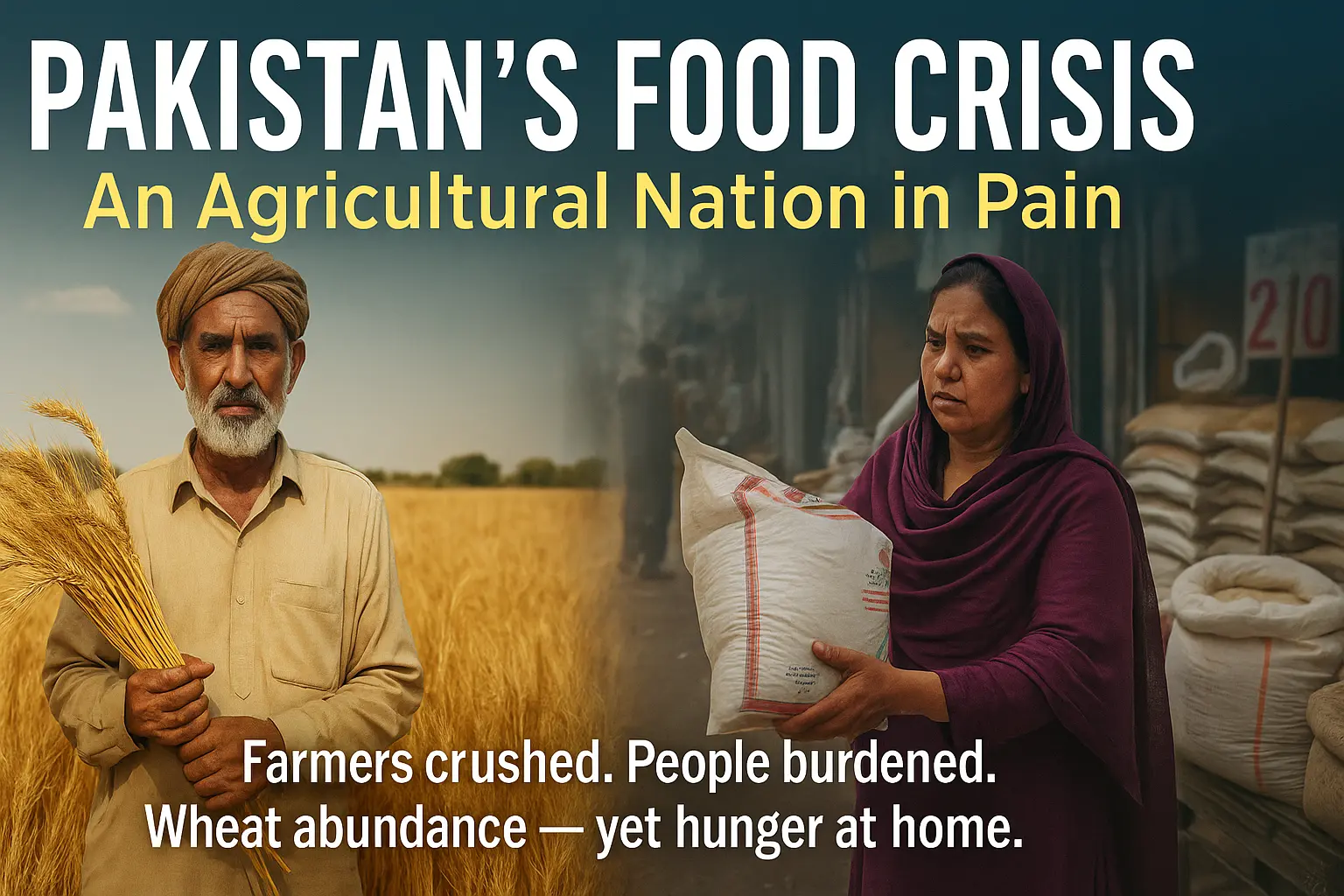Introduction: A Crisis That Never Ends
Once again, Pakistan is battling a wheat and flour crisis that has pushed millions into economic distress. Shelves are empty, prices are soaring, and the same cycle repeats policy confusion, weak governance, and lack of accountability.
This isn’t a story of drought or low production. It’s a story of how poor governance, broken procurement systems, and neglect of farmers have turned a food-producing country into one struggling to feed its own people.
Every few years, Pakistan faces this painful reality — and every time, it’s the ordinary citizens who suffer the most.
The Cycle of Mismanagement
Pakistan ranks among the top ten wheat-producing nations, yet the Pakistan food crisis keeps returning. The land produces enough grain; it is the system that fails to manage it.
Each harvest season, farmers work hard and produce millions of tons of wheat. But when the government fails to buy it on time, private hoarders and speculators step in. Bureaucratic delays, late payments, and corruption allow middlemen to manipulate markets.
As a result, flour prices skyrocket while official reserves shrink. The flour price hike is not caused by shortage — it’s caused by administrative negligence.
PASSCO and Punjab Food Department: The Failing Guardians
The two key institutions responsible for managing Pakistan’s wheat stock PASSCO (Pakistan Agricultural Storage and Services Corporation) and the Punjab Food Department have again failed to meet their targets.
PASSCO missed its procurement goals due to late funding, poor coordination, and outdated logistics. Meanwhile, the Punjab Food Department halted wheat supply to flour mills citing low reserves, which directly triggered the current flour shortage in Punjab and Islamabad.
These failures reflect a lack of planning, accountability, and inter-departmental coordination. Despite repeated warnings, no structural reforms have been introduced to prevent such crises from recurring.
Beyond Procurement: The Farmer’s Struggle
The government’s failure does not start in the warehouse it begins in the field.
Pakistan’s farmers are being crushed under rising costs and poor policy support.
Fertilizer prices have spiraled out of control due to weak regulation and profiteering by distributors. Diesel and electricity costs critical for tube wells and tractors have reached unbearable levels. Pesticides and seeds are sold at inflated prices, while subsidies for small farmers have been reduced or delayed.
This has created a painful reality: the very people who produce the country’s food are unable to afford their own wheat. Many small farmers are now shifting away from wheat cultivation, fearing losses they can no longer absorb.
Without immediate government intervention to stabilize fertilizer, diesel, and power rates, Pakistan’s agricultural foundation will continue to erode.
The People Pay the Price
For the ordinary Pakistani, this crisis means daily struggle. Flour prices have crossed Rs 180–190 per kilogram, forcing families to cut down meals or rely on inferior substitutes.
Tandoors have raised prices, bakeries have reduced production, and the cost of basic food items continues to rise.
It is a cruel irony a nation that produces wheat is forcing its citizens to buy their own produce at unaffordable rates. The flour price hike is not just an economic problem; it’s a social wound that deepens public frustration and weakens trust in leadership.
This is not starvation it is economic pain inflicted by mismanagement.
Agricultural Richness, Administrative Poverty
Pakistan’s vast plains, fertile soil, and irrigation systems make it capable of achieving food self-sufficiency. Yet, decades of political interference, policy inconsistency, and short-term thinking have left the system hollow.
Food security should be treated as a strategic national priority, not a seasonal management issue. Each government promises reforms but delivers only ad-hoc measures — emergency imports, raids on hoarders, or temporary subsidies.
Such actions may calm markets for a few weeks, but they do nothing to solve the structural problems that cause the wheat shortage and flour crisis to return every year.
The Policy Disconnect
The lack of coordination between federal and provincial bodies is another major cause of Pakistan’s repeated food emergencies.
• PASSCO manages federal wheat reserves,
• provincial food departments handle procurement and release, and
• agriculture ministries regulate fertilizers and farming inputs.
Yet, these institutions rarely work together. There is no unified command, no real-time data sharing, and no accountability mechanism.
By the time a crisis is recognized, it’s too late — and Pakistan ends up importing wheat at high prices, draining foreign exchange reserves that the economy can hardly afford.
A Roadmap for Reform
To break this recurring cycle, Pakistan needs a bold and practical roadmap for agricultural and food sector reform.
1. Ensure timely and transparent procurement directly from farmers to eliminate middlemen.
2. Digitize wheat stock tracking to prevent hoarding and manipulation.
3. Stabilize fertilizer, diesel, and electricity prices through smart subsidies for small and medium farmers.
4. Strengthen PASSCO and provincial food departments with clear accountability and modern warehousing.
5. Establish a National Food Security Council integrating agriculture, energy, and finance ministries for coordinated action.
6.Introduce farmer-friendly loan schemes to protect producers from exploitation by moneylenders.
Without these reforms, every new harvest will simply mark the beginning of the next Pakistan food crisis.
Conclusion: Producing Abundance, Purchasing Pain
Pakistan’s recurring food and wheat crises are not failures of the land, but failures of leadership and governance.
Farmers are struggling to survive under high input costs, while citizens are forced to pay inflated prices for the food they themselves grow.
Until Pakistan adopts a transparent, farmer-focused, and data-driven national food policy, the cycle of pain will continue — where a country rich in agriculture remains poor in management.
In the end, Pakistan’s greatest tragedy is not hunger, but the injustice of seeing abundance turned into burden.










